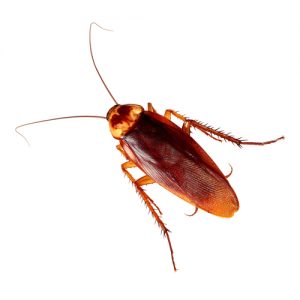Why Cockroaches Are So Successful
By Chris Williams on October 5, 2011.
Q. I’ve read more than once that cockroaches have been around since the days of the dinosaurs and that they will be the only survivors after a nuclear holocaust wipes out everything else. How come we can manage to exterminate other insect pests, but not cockroaches?
A. Those of us in the pest control business have great faith in the cockroach. It keeps us in business! Pesticide manufacturers keep coming up with new and better products, but it seems the cockroach always manages to catch up to our technology.
 The German cockroach is the main cockroach that invades buildings and used to be the #1 pest for pest control professionals. Almost 30 years ago, when cockroach baits were first developed, we saw the beginning of a dramatic decline in German cockroach numbers throughout the country. Eventually though, the cockroaches began developing resistance to the various baits, forcing manufacturers to hit the drawing boards again. Newer baits are still effective against cockroaches but now pest control professionals have to work a little bit harder to keep ahead of the cockroaches.
The German cockroach is the main cockroach that invades buildings and used to be the #1 pest for pest control professionals. Almost 30 years ago, when cockroach baits were first developed, we saw the beginning of a dramatic decline in German cockroach numbers throughout the country. Eventually though, the cockroaches began developing resistance to the various baits, forcing manufacturers to hit the drawing boards again. Newer baits are still effective against cockroaches but now pest control professionals have to work a little bit harder to keep ahead of the cockroaches.
These are just a few reasons why German cockroaches are so successful as pests:
1) They have a phenomenal rate of reproduction. One female cockroach and her offspring can theoretically produce hundreds of thousands of cockroaches in just one year!
2) They love heat and humidity-and that just makes them reproduce faster. German cockroaches prefer a temperature of 85 to 95°F. with humidity of 90 to 95%.
3) They spend most of their lives hidden in cracks and crevices-and that protects them from insecticides. For every cockroach in view in daytime, hundreds can be hidden inside wall and ceiling voids, behind cabinets, inside appliances, and the like.
4) They protect their egg cases. Unlike other cockroaches, German cockroaches carry their egg cases with them until just before hatching. While carrying her egg case, the female stays hidden so she has less chance of coming into contact with insecticides.
5) Their egg cases are not susceptible to insecticides. Most insecticides do not have the ability to penetrate the egg case, so egg cases can still hatch days after an insecticide treatment. Each German cockroach egg case hatches out about 40 cockroach nymphs.
6) They regularly disperse to new areas. Older, larger nymphs are most likely to disperse, followed by adult males, and then adult females without egg cases. Small nymphs are the least mobile.
7) They can detect and avoid many insecticides. Many insecticide sprays and dusts are repellent to cockroaches to a certain degree so the cockroaches will avoid treated areas by hiding in cracks and crevices.
8) They can develop resistance to insecticides. After repeated exposure to an insecticide, cockroaches become less susceptible. Eventually, the cockroach cannot be controlled with that insecticide, sometimes not even with related insecticides.
9) They can alter their normal behavior to adapt to changing conditions. Cockroaches that normally infest kitchens may be infesting a living room instead. Or, German cockroaches may be seen moving out in the open in bright light rather than hiding in dark places.